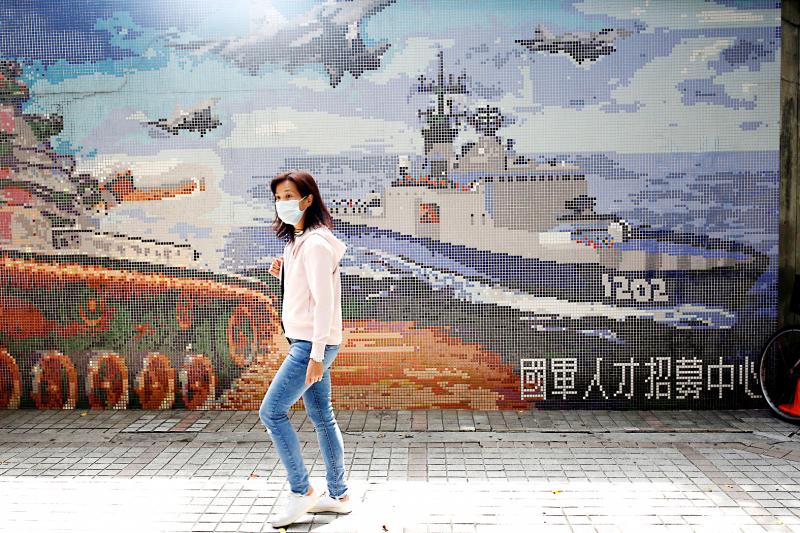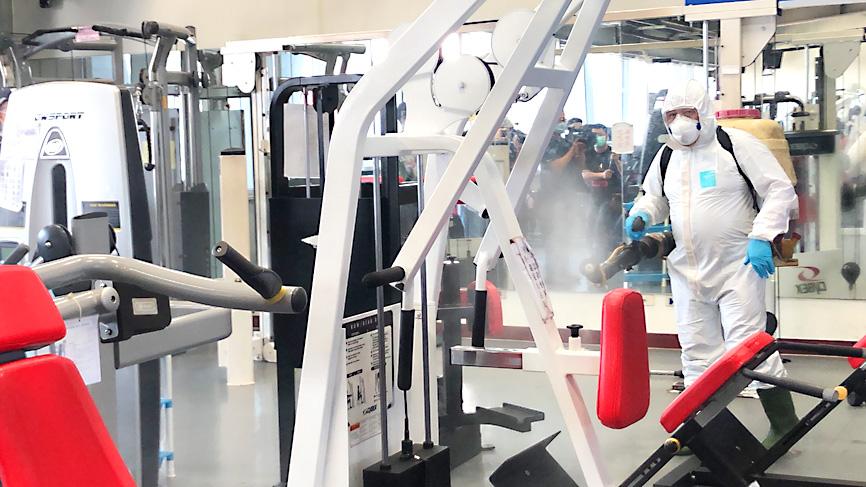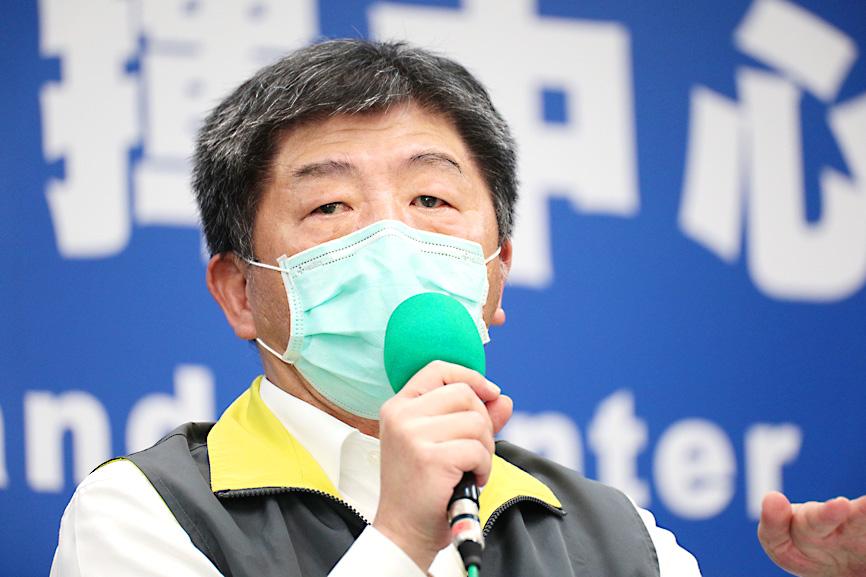The Central Epidemic Command Center (CECC) yesterday listed dozens of locations in 10 cities and counties visited by 24 sailors confirmed to have been infected with COVID-19.
It also announced two new imported cases, both women in their 20s who studied abroad and were tested at an airport after reporting symptoms to quarantine officers upon arriving in Taiwan.
Case No. 421 studied in Canada, developed a cough with phlegm on Monday last week and returned to Taiwan on Sunday, Minister of Health and Welfare Chen Shih-chung (陳時中), who heads the center, told the center’s daily news conference.

Photo: Ann Wang, Reuters
Case No. 422 studied in the US, visited Spain from Jan. 14 to March 15, developed difficulty breathing, and throat and abdominal pain on March 8, sought treatment after returning to the US, and returned to Taiwan on Saturday, he said.
The new cases brought the nation’s total to 422, including 203 people who have been removed from isolation after treatment, Chen said.
The CECC also followed up on a cluster of 24 cases confirmed in the crew of the navy supply ship Panshih (磐石).

Photo: Lo Hsin-chen, Taipei Times
The vessel, part of a “Friendship Flotilla,” visited Palau from March 12 to 15 before returning to Kaohsiung’s Zuoying Naval Base on April 9. The crew disembarked on Wednesday.
A total of 744 officers, sailors and cadets were recalled on Saturday evening for testing and put under 14-day centralized quarantine after the first case was confirmed earlier that day.
The center yesterday sent more than 200,000 text messages to people who had been to any of the more than 30 places in 10 cities and counties where the infected sailors had been for more than 15 minutes from Wednesday to Saturday, asking them to perform self-health management for 14 days, Chen said.

Photo: CNA
The CECC also published a link to an online map (bit.ly/2zdT9hH) showing the locations the infected sailors visited and the time they spent there.
Centers for Disease Control (CDC) Deputy Director-General Chuang Jen-hsiang (莊人祥) said the confirmed cases are 22 men and two women, with a median age of 27.
Seventeen of them are officers, six are Political Warfare Cadres Academy students and one is a Republic of China Naval Academy student, Chuang said.
The first case developed symptoms on April 1, eight cases developed symptoms from April 11 to Tuesday last week, seven from Wednesday to Saturday, and one developed symptoms on Sunday, he said, adding that seven cases are asymptomatic.
Of the 17 symptomatic cases, nine developed coughing, nine experienced an abnormal sense of smell, seven had abnormal senses of smell and taste, three had a headache, another three developed a fever, two had diarrhea and one experienced fatigue.
Six of them sought treatment on their own from Wednesday to Friday, but were mostly diagnosed with allergic rhinitis, loss of smell, throat pain or respiratory infection, he said.
“Considering the timing of the onset of symptoms, we think the cluster of cases has already involved a second wave of infections,” Chuang said. “We also expect there might be more cases in the incubation period who will begin suffering symptoms in the following days.”
The center is investigating the source of infection, he added.
Chang Shan-chwen (張上淳), convener of the CECC advisory specialist panel, said after retrieving medical records from medical officers on board the Panshih, they found five people had sought treatment for fever between March 21 and March 26, so those five were tested for COVID-19 antibodies on Sunday.
“While the five tested negative for COVID-19, three among them tested positive for COVID-19 antibodies, suggesting that they were infected earlier,” Chang said.
It is difficult to determine when they produced antibodies, but if the date they sought treatment marks the onset of symptoms, it was likely they infected others on board, he said.

AGING: As of last month, people aged 65 or older accounted for 20.06 percent of the total population and the number of couples who got married fell by 18,685 from 2024 Taiwan has surpassed South Korea as the country least willing to have children, with an annual crude birthrate of 4.62 per 1,000 people, Ministry of the Interior data showed yesterday. The nation was previously ranked the second-lowest country in terms of total fertility rate, or the average number of children a woman has in her lifetime. However, South Korea’s fertility rate began to recover from 2023, with total fertility rate rising from 0.72 and estimated to reach 0.82 to 0.85 by last year, and the crude birthrate projected at 6.7 per 1,000 people. Japan’s crude birthrate was projected to fall below six,

US President Donald Trump in an interview with the New York Times published on Thursday said that “it’s up to” Chinese President Xi Jinping (習近平) what China does on Taiwan, but that he would be “very unhappy” with a change in the “status quo.” “He [Xi] considers it to be a part of China, and that’s up to him what he’s going to be doing, but I’ve expressed to him that I would be very unhappy if he did that, and I don’t think he’ll do that. I hope he doesn’t do that,” Trump said. Trump made the comments in the context

SELF-DEFENSE: Tokyo has accelerated its spending goal and its defense minister said the nation needs to discuss whether it should develop nuclear-powered submarines China is ramping up objections to what it sees as Japan’s desire to acquire nuclear weapons, despite Tokyo’s longstanding renunciation of such arms, deepening another fissure in the two neighbors’ increasingly tense ties. In what appears to be a concerted effort, China’s foreign and defense ministries issued statements on Thursday condemning alleged remilitarism efforts by Tokyo. The remarks came as two of the country’s top think tanks jointly issued a 29-page report framing actions by “right-wing forces” in Japan as posing a “serious threat” to world peace. While that report did not define “right-wing forces,” the Chinese Ministry of Foreign Affairs was

PREPAREDNESS: Given the difficulty of importing ammunition during wartime, the Ministry of National Defense said it would prioritize ‘coproduction’ partnerships A newly formed unit of the Marine Corps tasked with land-based security operations has recently replaced its aging, domestically produced rifles with more advanced, US-made M4A1 rifles, a source said yesterday. The unnamed source familiar with the matter said the First Security Battalion of the Marine Corps’ Air Defense and Base Guard Group has replaced its older T65K2 rifles, which have been in service since the late 1980s, with the newly received M4A1s. The source did not say exactly when the upgrade took place or how many M4A1s were issued to the battalion. The confirmation came after Chinese-language media reported